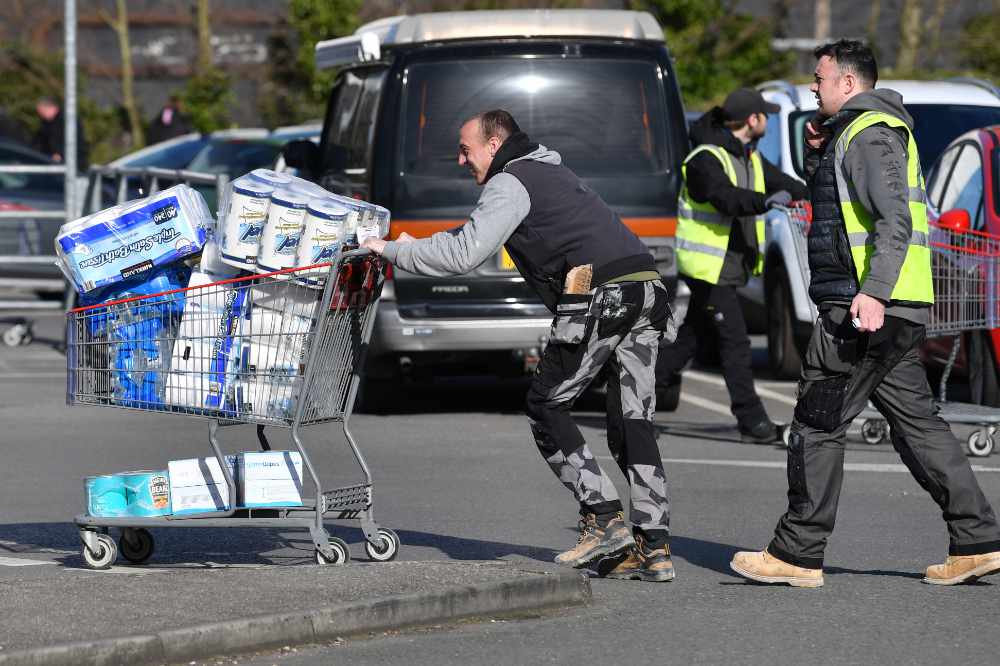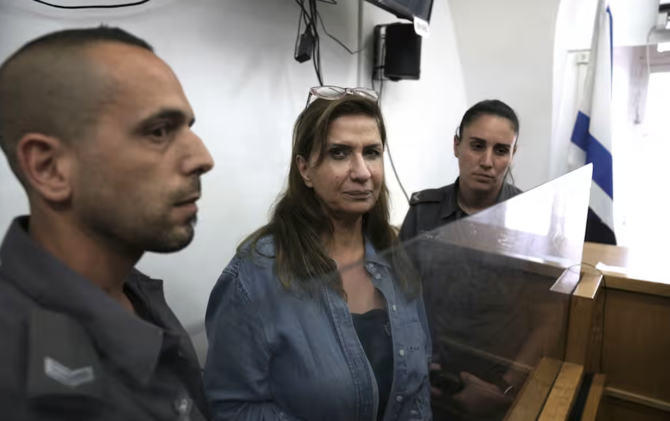WASHINGTON, DC: As the number of COVID-19 cases in the US continues to swell, a declared national emergency and state-wide lockdowns have led to a run on all kinds of products, from face masks and hand sanitizers to bottled water and canned food.
Turning into something of a holy-grail product, toilet paper has become the symbol of panic buying, the new normal in consumer behavior.
Across the US, throngs of patrons are tearing through supermarket aisles, loading toilet paper into overfull shopping carts.
Companies that help supply this everyday paper product were caught flat-footed, as stockpiling has led to shortages resulting in whole aisles being wiped clean.
“The hallmark of a crisis is loss of control, the sense that you have no say over how your life will evolve,” said Adam Alter, author of the marketing book “Irresistible” and a professor at New York University’s Stern School of Business.
“One way to take back that control is to find it in places where it still happens to be available, particularly in how you spend your money and the kinds of things you acquire,” he added.
“Toilet-paper hoarding makes sense when you consider that in many — but certainly not all — cultures, there’s no obvious alternative to toilet paper. It serves a purpose that people consider a necessity, and once people begin to hoard toilet paper, they send a signal that the product is scarce and so those necessary needs might not be met.”
FASTFACTS
- 57 Toilet-paper sheets used daily by avg. American
- 36 billion Toilet-paper rolls used by Americans yearly
- 15 million Trees lost to US toilet-paper consumption
- 253,000 Tons of bleach used in making toilet paper for US
The White House issued a statement urging Americans to ease up on stockpiling: “Supply chains in the United States are strong, and it is unnecessary for the American public to hoard daily essentials.”
The American Forest and Paper Association said in a statement: “Rest assured, tissue products continue to be produced and shipped.”
Such reassurances have fallen on deaf ears. No matter how quickly toilet paper is replenished, it is not staying on shelves for long.The supply chain is strained and production has reached capacity.
That has motivated desperate Americans to look for alternatives, and “very few exist that won’t clog your pipes,” said Alter.
A growing number of people are turning to an Old World device that has finally begun to gain traction in the US: The bidet.

Toilet paper is not staying on supermarket shelves for long and production has reached capacity, motivating customers to look for alternatives. (AFP )
A bidet, popular in the Middle East and parts of Asia, is a bowl designed to be sat on or a water hose for the purpose of washing after using the loo.
During the past couple of months, various bidet manufacturers have been struggling to cope with skyrocketing demand.
“Due to the increase of bidets sales, many items are on backorder or out of stock with all of the main suppliers in the industry,” said hellotushy.com, a company that brands itself as a “team of crusaders, fighting for clean bums and reduced global wastefulness … and ultimately turning people into born-again bidet lovers.”
According to Jason Ojalvo, CEO of Tushy, “Things started ramping up on March 9 and hit an insane high on March 13. We had a few days where we sold over $500,000 a day, including a day where we hit $1 million in sales.”
Born in France in the 1600s, the bidet took centuries before arriving at its present-day version.
Americans were first introduced to the bathroom fixture during World War II. American troops stationed in Europe would often see bidets in the bathrooms of brothels, and so came to associate them with sex work.
Given the country’s puritanical past, the returning troops were reluctant to introduce the device to their homeland. It became associated with sin, French hedonism and sexuality.
The device continued to evolve and morph into different variations, including a mini-shower attachment connected to the toilet.
The popularity of the plumbed bidets spread in Western Europe, the Middle East and Asia, as well as Latin America.
The device is still ubiquitous in Italy, Argentina and many other places, even though it is disappearing from the country where it was created.
In the 1960s, the American Bidet Co. took another run at making the bidet more acceptable to Americans by adding a spritzing function to the seat.
Opinion
This section contains relevant reference points, placed in (Opinion field)
The original inventor, Arnold Cohen, wanted to change the “habits of a nation, weaning us off” toilet paper.
Although he installed thousands of those seats all over New York, the result was a fiasco.
“Advertising was a next-to-impossible challenge,” Cohen said. “Nobody wants to hear about Tushy Washing 101.”
He gave up and left for Japan, a nation that actually listened to his message.
“Since the late 1800s, we have been led to believe that toilet paper does the job,” Miki Agrawal, the founder of Tushy, told Arab News via email.
“But all it does is cost us money every month (to the tune of billions of dollars per year if you add us all together), kills millions of trees per year, and causes chronic infections and disease down there.
“I mean, would you jump into your shower, NOT turn on the water, and start wiping down your body with dry paper?
“People would call you crazy! So why are we doing that to the dirtiest part of our body? It’s time to upgrade our toilet habit from dry toilet paper to a precise stream of clean water."
For his part, Jim Ace, a senior campaigner and action manager at STAND.earth, cautioned: “It’s important to keep in mind that not everyone has access to clean water, so for some people, bidets simply can’t be part of the solution right now.
“But where possible, bidets are an affordable, environmentally responsible alternative to toilet paper that destroys forests and harms wildlife.
“Our current public-health and economic crisis has motivated Americans to look for alternatives.

A woman carries groceries and toilet paper in New York City. (Photo by Angela Weiss / AFP)
“Charmin toilet paper can cost more than $1 a roll, while portable bidets can cost less than $10 and bidet attachments can cost less than $50.
“Countries around the world already use bidets, and in the US they’re starting to make economic — and environmental — sense.”
Over a year ago, STAND.earth sounded the alarm over the havoc toilet paper was wreaking on the environment.
Largely made of fresh-cut trees, toilet paper involves chopping down globally important forests such as the Boreal in Canada, which has declined more than 9 percent since 2000 from logging.
Toilet paper harms wildlife, causes soil erosion and requires lots of energy, water and chemicals to produce, which in turn pollutes our air, water and climate.
“Wiping our bottoms with fiber made from trees makes no environmental sense,” Ace said. “We’re literally flushing our forests.”





























